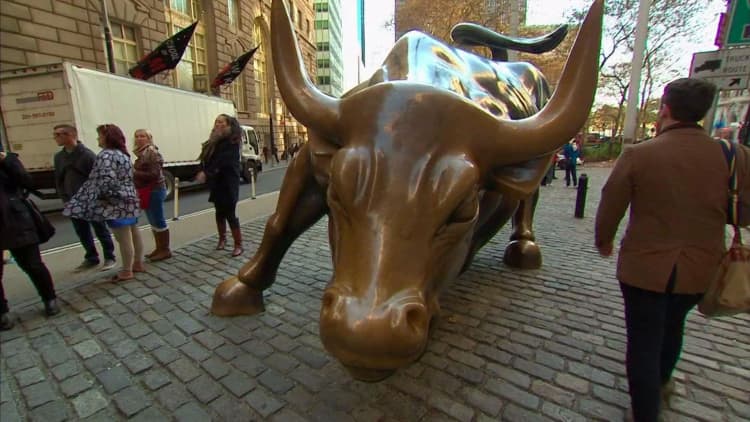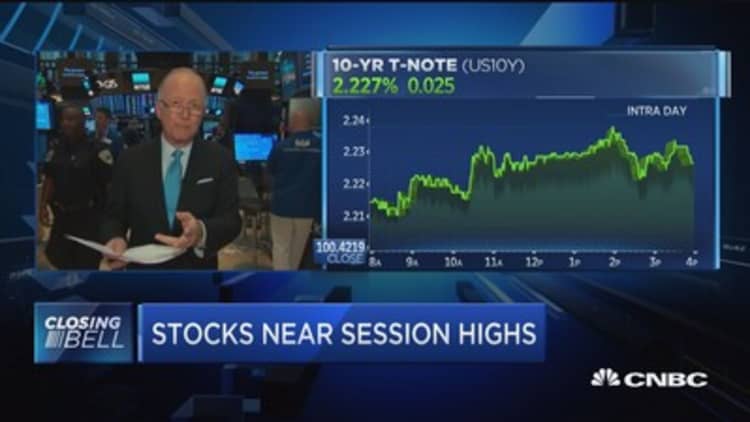
Amid devastating hurricanes, North Korean missile launches and political upheaval in Washington, equities in the U.S. simply keep jitterbugging their way toward fresh peaks. For 8½ years now, every dip has been followed by a push past the previous high.
Yet at some point, even as investors continue reaping the benefits of a market climb that's been fattening wallets and retirement accounts along the way, the party will come to an end. And if you haven't yet given thought to how a long-lasting stock slump could impact your nest egg, now's the time.
"The obvious is that the market will correct," said Greg Hammer, president of Hammer Financial Group in Schererville, Indiana. "It's just a matter of when and by how much."

So far this year as of Monday's close, the Standard & Poor's 500 index — a broad measure of how U.S. stocks are faring — is up 11.84 percent. The Dow Jones industrial average has posted a year-to-date return of 13 percent and the tech-laden Nasdaq composite index is ahead 19.91 percent. The historical average return is about 10 percent.
From 2009 through 2016, the S&P posted yearly average gains of 14.88 percent with a range of 1.38 percent in 2015 to 32.39 percent in 2013, according to Morningstar data.
The lengthy upward trajectory, which marks the second-longest bull market in history, began in early 2009. It came on the heels of a bear market — typically defined as a market drop of at least 20 percent followed by sustained pessimism — brought on by the subprime mortgage crisis that began 17 months earlier. Between Oct. 11, 2007, and March 9, 2009, the S&P shed 57 percent of its value. In 2008 alone, it was down 38.49 percent.
While there's no alarm sounding for an imminent plunge of similar magnitude, financial advisors recommend checking in on your portfolio if you haven't recently. For starters, the tidy asset allocation you might have originally started with — how you divvied up your money between stocks and fixed income like bonds and cash — could be out of whack.
"After 8½ years of a bull market, if you haven't watched your portfolio, you might have a lot more [stock investments] than you think," said Skip Johnson, co-founder of Minneapolis-based Great Waters Financial.
For instance, if you originally had 80 percent in stocks and 20 percent in bonds and cash, the gains in stocks mean they could comprise far more of your portfolio than you intended. And the more exposure you have to stocks, the more the value of your portfolio will zigzag.
Top Five Bull Markets Since 1928
| Date | # of days* |
|---|---|
| 12/4/87-3/24-00 | 4,494 |
| 3/9/09-current | 3,114** |
| 6/13/49-7/15/57 | 2,954 |
| 10/3/74-11/28/80 | 2,248 |
| 8/12/82-8/25/87 | 1,839 |
Source: * Includes wknds & holidays ** through 9/18/17 Source: Yardeni Research
If you're already beyond the days of earning a paycheck or nearing that time, advisors say part of your portfolio should be protected from market gyrations to help prevent you from selling stocks at a depressed price when you need income.
"If there's any portion of your portfolio that you think you're going to spend in the next two years, you need to keep that out of the market," said Nancy Coutu, a certified financial planner and co-founder of Money Managers Financial in Oak Brook, Illinois.
When it comes to people who are far from retirement, advisors generally say you should ignore the ups and downs of the market. That is, if you're in it for the long haul, remind yourself that corrections — no matter how severe — are always followed by upswings in the market.
"Younger workers should put as much as they can afford in their 401(k)s and let it ride," Coutu said. "When the market goes down, you're buying shares at a cheaper price."
Top Five Bear Markets Since 1928
| Date | # of days* |
| 3/24/00-10/9/02 | 929 |
| 4/10/30-6/1/32 | 783 |
| 1/11/73-10/3/74 | 630 |
| 11/28/80-8/12/82 | 622 |
| 11/9/40-4/28/42 | 535 |
Source: * Includes wknds & holidays Source: Yardeni Research
Regardless of whether you're in retirement or not, it's also worth revisiting your risk horizon (how long until you need the money) and your risk tolerance (how well you stomach big market drops) to help fortify you — both financially and emotionally — when a storm hits. If your portfolio properly reflects those factors, a drop in the value of your stock holdings should cause little stress even if the slump stretches.
Coutu also points out that stock volatility and bear markets are normal. If you get spooked and sell after a big drop, not only are you selling stocks at a low price, you're also going to miss the eventual upward climb.
"Whenever the market goes down, we know it will go back up," Coutu said. "We just never know how long it'll be until it comes back."





